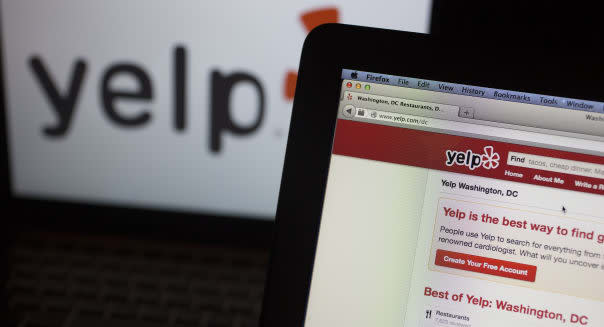Yelp Can Still Rate Itself 4 Stars, Despite a Few Bad Reviews

A growing number of merchants and customers are finding reasons to complain about Yelp (YELP), but its fan base is apparently growing even faster. The local rating review site operator posted another blowout quarterly report on Wednesday night.
Net revenue soared 66 percent to $76.4 million, just ahead of the $75.1 million that analysts were expecting. Yelp's still losing money, but its quarterly deficit was cut in half to 4 cents a share. Wall Street was expecting more red ink, and that's a good thing. This is only the second time over the past five quarters that Yelp has bested analyst bottom-line targets.
Yelp's rocking, despite the criticism over its alleged business practices.
Success Attracts Enemies
But it's critics didn't take a break to let Yelp enjoy those upbeat numbers. Just an hour after it reported quarterly results -- while it was halfway through its conference call, in fact -- a San Diego law firm issued a press release of its own. Johnson & Weaver, which calls itself a shareholder rights specialist, is launching an investigation into Yelp's practices. The goal is to verify if Yelp is requiring business customers to pay in order to suppress negative reviews.
The accusation isn't new, stemming from a recent Federal Trade Commission revelation that it has received more than 2,000 complaints from merchants. The gripes suggest that companies' refusal to become premium Yelp businesses accounts resulted in the site featuring negative reviews about them.
This isn't the first class action lawsuit trying to strike back at Yelp. A pair of suits tried to get off the ground a few weeks earlier.
Yelp denies the allegations, though it doesn't dispute that its premium members get a leg up on the competition. That's the nature of advertising. Companies bid for top slots on the leading search engines, so why can't a free review site let local businesses pay for better exposure?
Visitors and merchants continue to flock to Yelp in record numbers. There are now 57 million cumulative reviews on the site, 46 percent ahead of where it was a year earlier. Average monthly unique visitors are up 30 percent to 132 million. It's great to see reviews growing faster than usage. It's a testament to Yelp's stickiness and engagement among folks looking for a place to eat or a spa to check out.
Don't Bet Against the Networking Effect
Businesses can't ignore Yelp's growing captive audience, and that end of the equation is growing faster. The number of active local business accounts clocked in at 74,000 at the end of March, a 65 percent improvement over the past year.
That's called the networking effect. Customers go where the merchants are, and merchants -- in turn -- go to where the customers can be found. The reason that eBay (EBAY) became so popular as a marketplace even though there were plenty of free or nearly free alternatives is that it had the networking effect in its favor.
%VIRTUAL-article-sponsoredlinks%This doesn't mean that Yelp can ignore the rising dissent from a small number of local businesses. Yelp's model relies on users populating its website with content, and the last thing that it needs is for reviewers to turn on the site. After all, they aren't getting paid to write those comments. The more active and prolific reviewers do get invited to restaurant and bar openings and outings, but even they may question their loyalty if their words are being used to coerce merchants to pony up as sponsors.
At this point, the claims are limited to accusations, and Yelp has countered that its sales team doesn't have access to back-end administrative privileges. It has also beefed up its filtering system to weed out bogus reviews. For now, that's been more than enough to keep consumers coming and contributing.
Motley Fool contributor Rick Munarriz has no position in any stocks mentioned. The Motley Fool recommends eBay and Yelp. The Motley Fool owns shares of eBay. Try any of our newsletter services free for 30 days.

